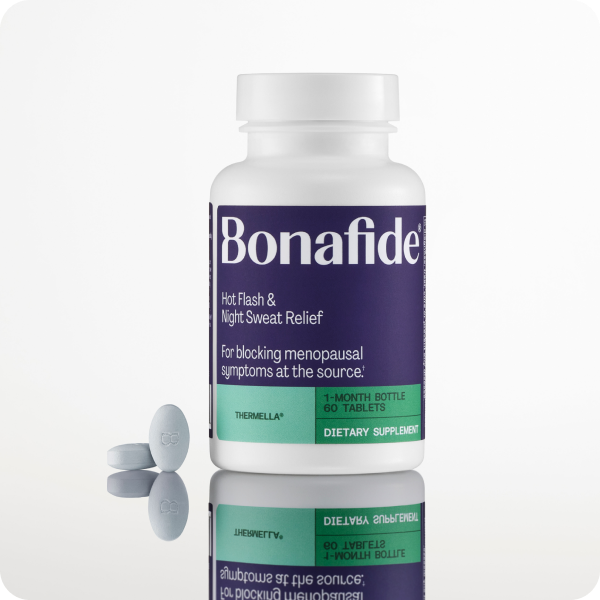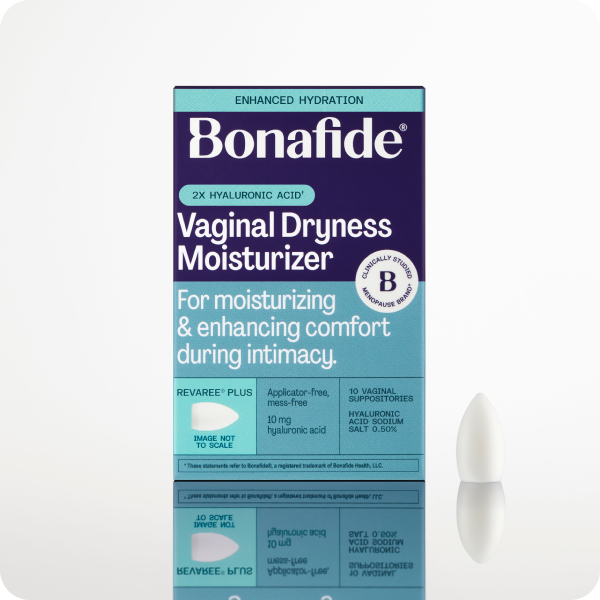Most women have a basic knowledge of menopause, and many are aware of some of the common symptoms, like irregular periods or mood swings. What isn’t always understood, however, is that menopause is preceded by a transitional period of time called perimenopause. Perimenopause is a gradual process that unfolds slowly over several years. This transition is often accompanied by both physical and emotional symptoms.1
Dr. Rebecca Levy-Gantt, DO, explains what’s going on in the body during perimenopause. “Perimenopause is a period of time, from approximately age 43 to age 52. It is a transitional period, where things are changing. Ovarian function is diminishing, but it has not yet ceased producing hormones completely.” During this time, amounts of estrogen and progesterone, two hormones produced by the ovaries, vary greatly, and this fluctuation can instigate a variety of perimenopause symptoms.2
Dr. Levy-Gantt goes on to explain how some women might experience the beginning stages of perimenopause, including what the common signs and symptoms of perimenopause are: “One day, or one week, [a woman may] feel well, energetic, happy, engaged—and the next week, or sometimes the next day, feel tired, depressed, have poor sleep, [or feel] angry. This is caused by the hormones that are being released in an irregular pattern, which often gives a woman no way to anticipate the changes.” While the initial stages of perimenopause vary from person to person, all women experience the same final stage, called menopause: which is when 12 full months pass without a period.3
It's important to emphasize that the perimenopause experience truly may be different for every individual. “Some women have a worse transition through their perimenopause,” says Dr. Levy-Gantt. “Very few women experience no perimenopause symptoms at all, but the intensity of their symptoms is dependent on several things. Genetics can influence symptom severity, so if a close family member had a rough transitional time, chances are good that you might, too.” Dr. Levy-Gantt says that general health is also a factor, and women who exercise regularly, limit alcohol intake, and follow a healthy diet often have less intense perimenopause symptoms.
So, what are the symptoms of perimenopause? Read on for an overview of some of the most asked questions about perimenopause symptoms.
Are Irregular Periods a Sign of Perimenopause?
Periods that are longer or shorter, or heavier or lighter than your normal period are a hallmark symptom of perimenopause. Women may also skip periods or experience irregular timing of periods during perimenopause. These changes in the menstrual cycle occur as ovulation becomes unpredictable, and they are often the first sign of perimenopause. Sixty or more days between periods can help indicate that a woman may be nearing the end of perimenopause.4
Are Perimenopause Hot Flashes Normal?
A hot flash is a sudden, sensation of intense heat that often starts in the chest and creeps up to the neck and head. About 75% of women experience hot flashes during menopause, which may occur anywhere from a few times a week to several times daily, and medical professionals believe hot flashes are associated with fluctuating estrogen levels and the effect this has on the brain.5 While Dr. Levy-Gantt says her patients report the symptom of hot flashes more often in postmenopause than in perimenopause, some woman still may experience hot flashes as a symptom of perimenopause, as well.
Can Perimenopause Cause Mood Swings?
If you’re feeling irritable one day and anxious the next, know that it’s typical to experience emotional highs and lows, commonly referred to as mood swings, during perimenopause; these mood swings can also present as a common perimenopause PMS symptom. “The most common symptom I see in perimenopause is mood swings,” Dr. Levy-Gantt says. “Women who previously have felt relatively calm and able to control most aspects of their lives suddenly find themselves anxious, depressed, irritated, not sleeping, or even angry, without feeling like they can identify a reason." Also, women who experience stress during midlife, or who are in poor health or who have a history of depression, are most likely to experience mood swings related to hormonal changes.6
Is Breast Pain Common in Perimenopause?
A cyclical variation in hormones experienced during perimenopause might cause breast tenderness, uncomfortable fullness and cystic changes. During the pre-menstrual time-period, this typically resolves with onset of your period. Perimenopause symptoms can be more varied. Similarly, hormone changes that occur during perimenopause — specifically, the rise and fall of progesterone and estrogen levels — can cause the breast tenderness, breast pain, swelling and pain women typically associate with PMS;7 this can translate into a perimenopause PMS symptom.
Can Perimenopause Cause Sleep Problems?
Sleep disruption occurs frequently and is considered a perimenopause symptom—with as many as 60% of women reporting sleep disturbances.8 This can include difficulty falling and staying asleep, as well as rising earlier than usual. Night waking, too, is common in perimenopause, and may be due to night sweats; or hot flashes that occur at night. Other age-related issues can also cause poor quality sleep, including sleep apnea and restless leg syndrome (RLS), so check with your healthcare provider to rule out more serious medical conditions if you’re noticing your sleep patterns begin to change.9
Is Fatigue a Sign of Perimenopause?
Speaking of sleep issues during perimenopause, feelings of fatigue are another symptom of perimenopause. Trouble falling asleep and staying asleep can cause daytime fatigue and mental fogginess. Sleep disruption can also be directly related to the physical discomfort of night sweats and the need to get up to change sleep clothes, possibly multiple times in one night. The busy mind then takes over and getting back to sleep can become a torturous, viscous cycle. Additionally, progesterone and estrogen are two of the hormones that likely play a role regulating your body’s cellular energy and metabolism. The spikes and drops that happen during perimenopause can throw these two hormones out of whack, bringing on sudden bouts of tiredness.10
Are Migraines a Symptom of Perimenopause?
Many women may experience hormonal headaches, one of the signs of perimenopause. For those women who still menstruate regularly, headaches are often cyclical, typically starting just before their period when estrogen levels drop. Perimenopausal women may also complain of headaches since estrogen levels are so volatile during this time. Shifting levels of progesterone may also contribute to headaches during perimenopause, but the link is less clearly established.11
Can Perimenopause Cause Urinary Problems?
It’s not uncommon for some women to experience an increase in urinary tract infections (UTIs) as a symptom of perimenopause. There are several reasons why this happens, like lower estrogen levels causing the vaginal microbiome’s delicate balance of bacteria to change in addition to instigating the thinning of the vaginal walls. Strategies for preventing infection include drinking plenty of water to flush out harmful bacteria and emptying your bladder as fully as possible.12
Can Perimenopause Affect Bowel Movements?
Many women complain of gastrointestinal distress both before menstruation as well as during the perimenopausal transition. These are both instances where it’s possible to point to your hormones as a reason for how you're feeling. Progesterone influences gut motility and can be responsible for perimenopause symptoms like constipation, more frequent bowel movements, and bloating.13 Water retention can only worsen this distress, intensifying this symptom.
Can Perimenopause Make You Gain Weight?
Nobody likes putting on unintended additional weight, but Dr. Levy-Gantt explains this can often be perceived as a perimenopause symptom: “The second most common complaint I hear from my patients during perimenopause, is about weight gain, especially mid-abdominal, or ‘spare tire’ weight gain,” she says. It’s common for women to gain about 2-5 pounds during perimenopause; this is due to fluctuating estrogen, progesterone, and other hormones, which may lead to increased appetite, and in turn, fat accumulation.14
Are Vaginal Changes Common in Perimenopausal Women?
Changes to the vaginal structure (due to decreased estrogen levels) may result in uncomfortable symptoms for some women in perimenopause, such as tightening of the vaginal opening, burning, itching, vaginal atrophy (dryness), and pain during sex.15
Dr. Levy-Gantt adds that low libido can also be a perimenopause symptom. “I hear quite often from women who struggle with and are frustrated with low libido. [Often they] previously had good or even great interest in sex, and now not so much, or not at all.”
It’s important to be aware of potential changes on the horizon of perimenopause and understand what’s happening now if you're currently experiencing perimenopause symptoms. And if you are uneasy about this transition or are having trouble managing your symptoms, Dr. Levy-Gantt encourages women to ask their healthcare provider for advice to help make your personal transition easier.
Learn more about perimenopause symptoms from Bonafide Chief Medical Officer, Dr. Alyssa Dweck, below.
Resources
- https://www.hopkinsmedicine.org/health/conditions-and-diseases/perimenopause
- https://www.nia.nih.gov/health/what-menopause
- https://www.mountsinai.org/health-library/report/menopause
- https://www.mayoclinic.org/diseases-conditions/perimenopause/symptoms-causes/syc-20354666
- https://www.webmd.com/menopause/features/menopause-sweating-11
- https://www.health.harvard.edu/womens-health/perimenopause-rocky-road-to-menopause
- https://www.mayoclinic.org/diseases-conditions/breast-pain/symptoms-causes/syc-20350423
- https://www.goodsleep.clinic/sleep-problems-menopause
- https://www.womens-health-concern.org/help-and-advice/factsheets/menopause-and-insomnia/
- https://www.medicalnewstoday.com/articles/menopause-fatigue#causes
- https://www.mayoclinic.org/diseases-conditions/chronic-daily-headaches/in-depth/headaches/art-20046729
- https://www.princetongyn.com/blog/new-solutions-for-menopause-related-chronic-urinary-tract-infections
- https://www.med.unc.edu/ibs/wp-content/uploads/sites/450/2017/10/IBS-and-Hormones.pdf
- https://www.healthline.com/nutrition/menopause-weight-gain#weight-and-perimenopause
- https://www.nia.nih.gov/health/sex-and-menopause-treatment-symptoms












